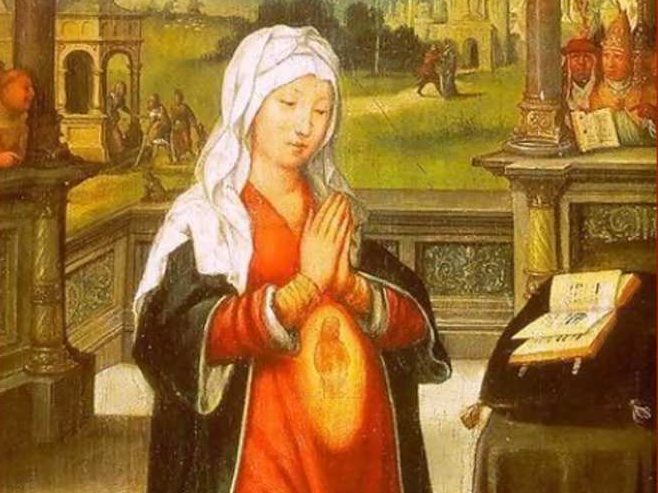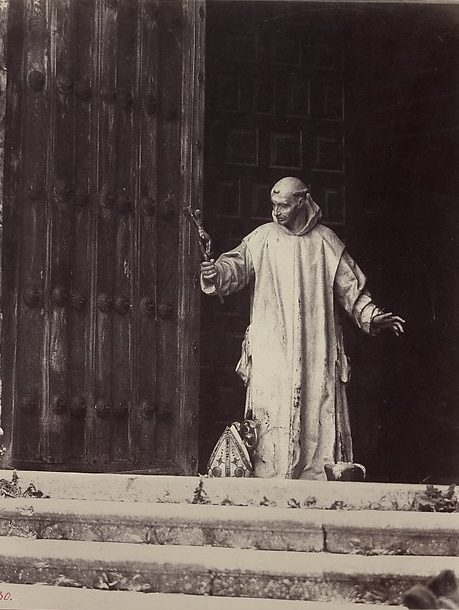Jesus in the Eucharist,
Give me the grace of a cheerful heart,
An even temper, sweetness,
Gentleness, and brightness of mind,
As I walk in your light and by your grace,
I pray you give me the spirit of over-abundant,
Ever springing love,
Which overpowers the vexations of life,
By its own riches and strength,
And which, above all things, unites me to you,
Who are the fountain and center of all
Mercy, loving, kindness, and joy.
Amen.
Psalm to the Divine Master (based on Psalm 23)
The Lord is my Master,
He teaches me the art of living.
Most patient, He understands
The inner movements of my soul.
The Lord lights up my darkness.
Through all creation, He teaches me—
I will sit forever at His feet.
He speaks softly within me,
Leading me by my own heart.
Though I can’t see the path,
His eyes never lose me,
Turning to Him I am safe,
Wrapped in the blanket of His love.
He calls me to follow Him more closely—
Clasping His nail-pierced hand.
My Master died and rose for me,
Loving me into life,
He transforms every sadness,
His ever-present kindness and mercy
Make each day shine anew.
I sing out my joy in Him.
And proclaim His abundant goodness—
He fills up my life.
Early morning Mass at St Dominic and prayer with spiritually mature souls, three of us in conclusion. I then went into work for the morning, rushing in order to make Adoration prayers at St Paul Shrine. The morning was a bit futile as the excellent job I thought I performed and constructed was not what my boss had in mind. He was gracious, yet I felt frustrated. The drive to the Shrine proved startling in revelation. I have been focused upon the Youtube videos of Father David Mary and his Franciscan Brothers Minor. They have just put out an incredible series on the topic of ‘The Service of Authority and Obedience’–being in leadership and being in obedience. Listening in bed reposed, I was greatly moved by the lecture of Brother Joseph Maria, falling asleep before its conclusion, admiring the word promulgate. I awoke to the commanding voice of Father David Mary, inspiringly speaking about love, the necessity of love in the collaborative effort of authority and obedience, hammering home his ever present message that all effort must arise from a healthy and exercised prayer life—associating the proper role of prayer in a consecrated individual’s life as his spiritual mistress, a tenant from the Franciscan constitution. He stressed that the early Capuchins found leadership a burden, a diversion from their profound desire to live a simple life of contemplation. The video in the series that stunned me while driving from work to St Paul Shrine, Be Opened—Ephphatha, was a lecture by Brother Fidelis Maria. I linked to the video, also promoting the others I mentioned. There are powerful words within all the videos, the Holy Spirit gracing the community with wisdom and understanding, and the ability to humbly articulate. Starting about the twenty-fifth minute of the lecture, driving upon the highway, in the sunshine of an absurdly warm day, a dreamlike sense of acuteness overcame me as Brother Fidelis words pierced and penetrated. I knew God wanted me to hear these words, to comprehend them, and be open to them—to take them in and process them for the sake of strengthening. Condemnation, or trivial knowledge amassing, was NOT the point. Within love and healing, God graced an awareness these words were important to my future. The video concluded with Brother closing out his words with a passionate plea to the Mother of Fairest love, Mary guard and protect us all. I arrived at St Paul Shrine disheveled, forgoing Mass, seating myself amidst the turmoil of triviality. Blocking and centering myself, waiting for communal Adoration prayers, shutting down my mind as the surrounding children immediately after Mass broke into chatter before the exposed Eucharist, understanding God was demanding control before the frivolity and willingness of spiritual children to splash around in muddy shallow water. Soon the Church was empty, except for the small prayer group and the Eucharist. Within prayer, I reflected upon my post yesterday morning, especially the video from the esteemed Catholic scholar Father Peter Fehlner. Before spending the day watching Franciscan Brothers Minor videos, I recalled, during prayer, meeting Father Fehlner with Father David Mary. If you observe the background of the Father Fehlner video, you will see an image of Our Lady of Guadalupe. The senior father is stationed at the Our Lady of Guadalupe Shrine in La Crosse, Wisconsin. Returning from a retreat at a seminary in Wisconsin, we stopped at the shrine. Touring the premises, we were graced with the gracious attention of Father Fehlner. I had no idea who he was, although I was impressed with the immense respect Father David Mary showed him, understanding he studied under him. My lasting impression was the elder’s presence and booming voice, his words captivating in tone and utterance. It was easy for matters to settle into proper perspective before the Eucharist, second Holy Hour of the day, and prayer. My spiritual mistress appeased, providing the peace to ponder without effort or demand, simplicity and authenticity subtly kissing the mind. The heart seeking purity. I want to quote words from Pope Francis that Brother Fidelis quoted from the newspaper, exploring the idea of ‘culture of the provisional’. Individuals of modern civilization who are ruled by the provisional, a temporary mindset (maturity) lacking in conviction and the ability to be humbled and struggle through adversity, always willing to throw aside ideas, people, and circumstances according to the whims of individual will. Let’s be clear on the word provisional by defining: temporary, providing or serving for the time being only; existing only until permanently or properly replaced, impermanent, a provisional government. 2. Accepted or adopted tentatively; conditional; probationary.
Pope Francis:
“I heard a seminarian, a good seminarian, who said he wanted to serve Christ, but for just ten years, after which he would think about starting a new life… This is dangerous! Listen carefully: all of us, even the oldest among us, we too find ourselves under pressure from this culture of the provisional; and this is dangerous, because we no longer commit our lives once and for all. I’ll be married for as long as I’m in love, I’ll become a nun for a little while, and then we’ll see; I’ll become a seminarian to become a priest but I’m not sure how it will turn out. This is not what Jesus wants! … Nowadays, making a definitive choice is very difficult. It was easier in my day, because culturally a definitive choice was preferred, be it for matrimonial life, or consecrated life, or the priestly life. But in the present day a definitive choice is not easy. We are all victims of this culture of the provisional”.
“I would like you to think about this”, Pope Francis continued. “How can we be free of this culture of the provisional? We need to learn how to close the door of our innermost being, from the inside. … but when we always leave a key outside, just in case – that is not enough. We need to learn to close the door from the inside! And if I am not sure, I think, I will take my time, and when I feel sure – in Jesus, you understand, because without Jesus no-one is sure! – when I feel sure, I’ll close the door. Do you understand this? What is the culture of the provisional?”
Finally, if anyone linked to Brother Fidelis’ video, this link here presents further: The Baars Institute








Recent Comments